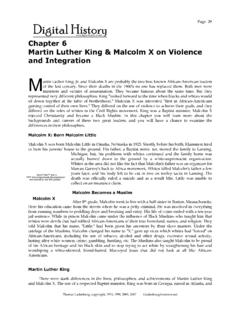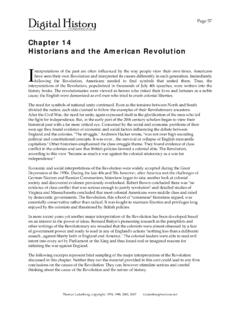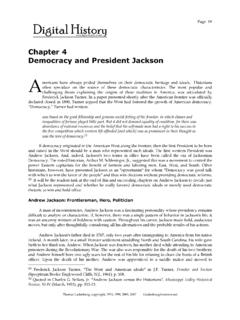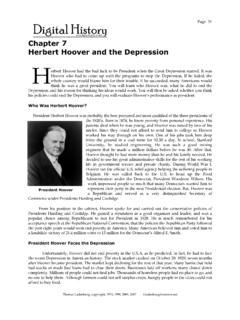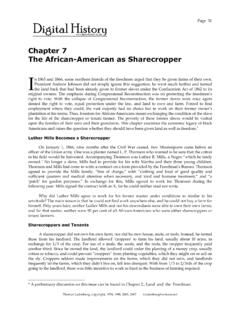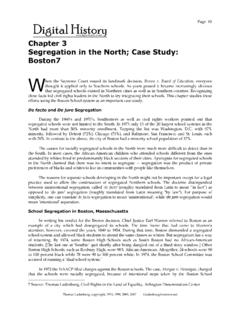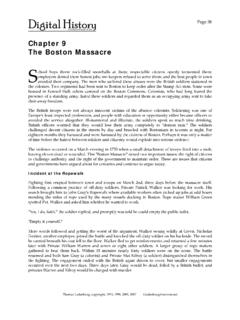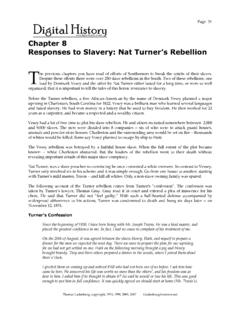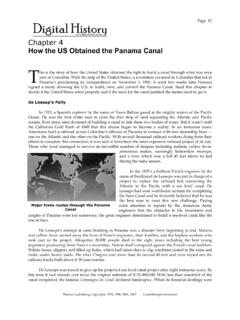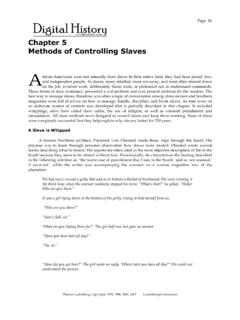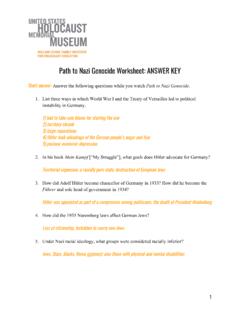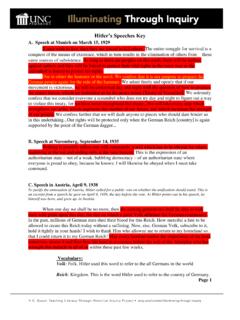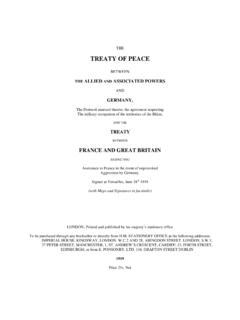Transcription of Part I Chapter 1 The Rise of the Dictators
1 Page 1 Thomas Ladenburg, copyright, 1974, 1998, 2001, 2007 Part I Chapter 1 The Rise of the Dictators ight reflected off the mirrored walls along which the victorious Allied heads of state sat. More than a thousand diplomats, soldiers, secretaries, and reporters filled the vast hall. It was mid-afternoon, June 28, 1919, at the Palace of versailles , just outside of Paris. President Wilson of the United States, Prime Minister Lloyd George of Britain, and Premier Clemenceau of France waited for the German representatives to arrive.
2 At 2:45, Dr. Hermann Muller and Dr. Johannes Bell entered the Hall of Mirrors. Muller and Bell listened tensely to the aged Clemenceau s reminders about germany s obligations. Then they stepped forward to sign the treaty on the small table in the center of the room. As the Allied representatives lined up to put their own signatures on the document, cannons saluted and crowds cheered. World War I, which had shaken the very foundations of Europe and resulted in the deaths of hundreds of thousands of people, had finally come to an end.
3 Many hoped that the treaty of versailles would bring a lasting peace. Yet in fewer than 15 years, the treaty s flaws contributed to the rise of militant Dictators in the heart of Europe in Russia, Italy, and germany The Flawed Peace World War I, or the Great War, as it was known at the time, had begun in August 1914. Decades of territorial rivalry, militarism, national pride, and secret alliances had poisoned relations among Europe s most powerful nations.
4 The sparks that ultimately ignited the war, ironically, originated from some of Europe s weakest nations, the Austro-Hungarian Empire and the Russian Empire. When a Serbian anarchist assassinated Archduke Francis Ferdinand, heir to the Austro-Hungarian throne, tensions heightened between Austria-Hungary and Serbia s eastern ally, Russia. A flurry of secretive diplomatic discussions ensued between these two nations and Europe s greatest powers, and within a matter of days Europe had been divided into two warring camps: the Central Powers ( germany , the Ottoman Empire, Bulgaria, and Austria-Hungary) and the Allied Powers (France, Russia, and Britain); Italy and the United States would eventually enter the war to aid the Allies.
5 During the four years of brutal warfare in Europe, Asia, and Africa, 30 million soldiers were killed or wounded and hundreds of billions of dollars were spent. By the fall of 1918, Austria-Hungary and germany were in a state of revolutionary disintegration. Moreover, the German army could no longer simultaneously defeat Allied attacks in the field and put down unrest in the streets. The German emperor gave up his throne; and on November 11, 1918, germany asked the Allies for an armistice to end the war.
6 Germans hoped that they would be given a fair peace based on the principles of President Woodrow Wilson s idealistic Fourteen Points for World Peace. LClemenceau and Wilson at versailles Page 2 Thomas Ladenburg, copyright, 1974, 1998, 2001, 2007 Wilson s peace program, announced in January 1918, called for universal disarmament, the impartial adjustment of colonial claims, the self-determination of national peoples, and the formation of an international organization to keep the peace.
7 In fact, however, the treaty imposed on the new German democratic government did not reflect the principles of the Fourteen Points. germany alone was blamed for the war and made to pay for it; germany was disarmed, deprived of its colonies as well as 10% of its lands, and barred from joining the League of Nations. In keeping with promises made by Wilson, separate national entities were created. An independent Poland, Hungary, Czechoslovakia, Latvia and Lithuania, emerged from World War I, partially satisfying its people s national aspirations for independent governments.
8 In contrast, Italy was denied both significant territorial gains and colonies, despite heavy wartime losses and promises from France and Great Britain. The newly formed Soviet government was not even invited to versailles , and like germany , was barred from joining the League of Nations. Within fourteen years, Russia (which had become the Soviet Union), Italy and germany , the biggest losers at versailles , were in the hands of Dictators who threatened Europe s peace. Revolutionary Russia The Russian Empire was the first state of the old order to be undermined by the war.
9 Military defeat, economic hardship; and government mismanagement sowed discontent throughout Russia during the winter of 1916. Political opponents of Tsar Nicholas II took advantage of widespread strikes and mutinies. On March 12, 1917, they overthrew the monarchy. A constitution-writing assembly was to be elected in the fall to consider long-delayed reforms such as land redistribution. Meanwhile, the Provisional Government, led by prime minister Alexander Kerensky, held the reins of power in the Russian capital at Petrograd, The first democratically selected leader of the Russian Empire, Kerensky made the fatal mistake of resisting pressure to take Russia out of the World War I.
10 Many Russians believed that social and political reform should be enacted right away. The national council of worker and soldier organizations (the Petrograd Soviet) thought that the Provisional Government ought to end the war immediately. A veteran revolutionary, Vladimir Illych Lenin, returned to Russia in April 1917. His program, known as the April Thesis, sought to capitalize on impatience with the Provisional Government. He advocated ending the war with germany and giving land to the peasants, control of factories to the workers councils, and independence to the nationalities.
